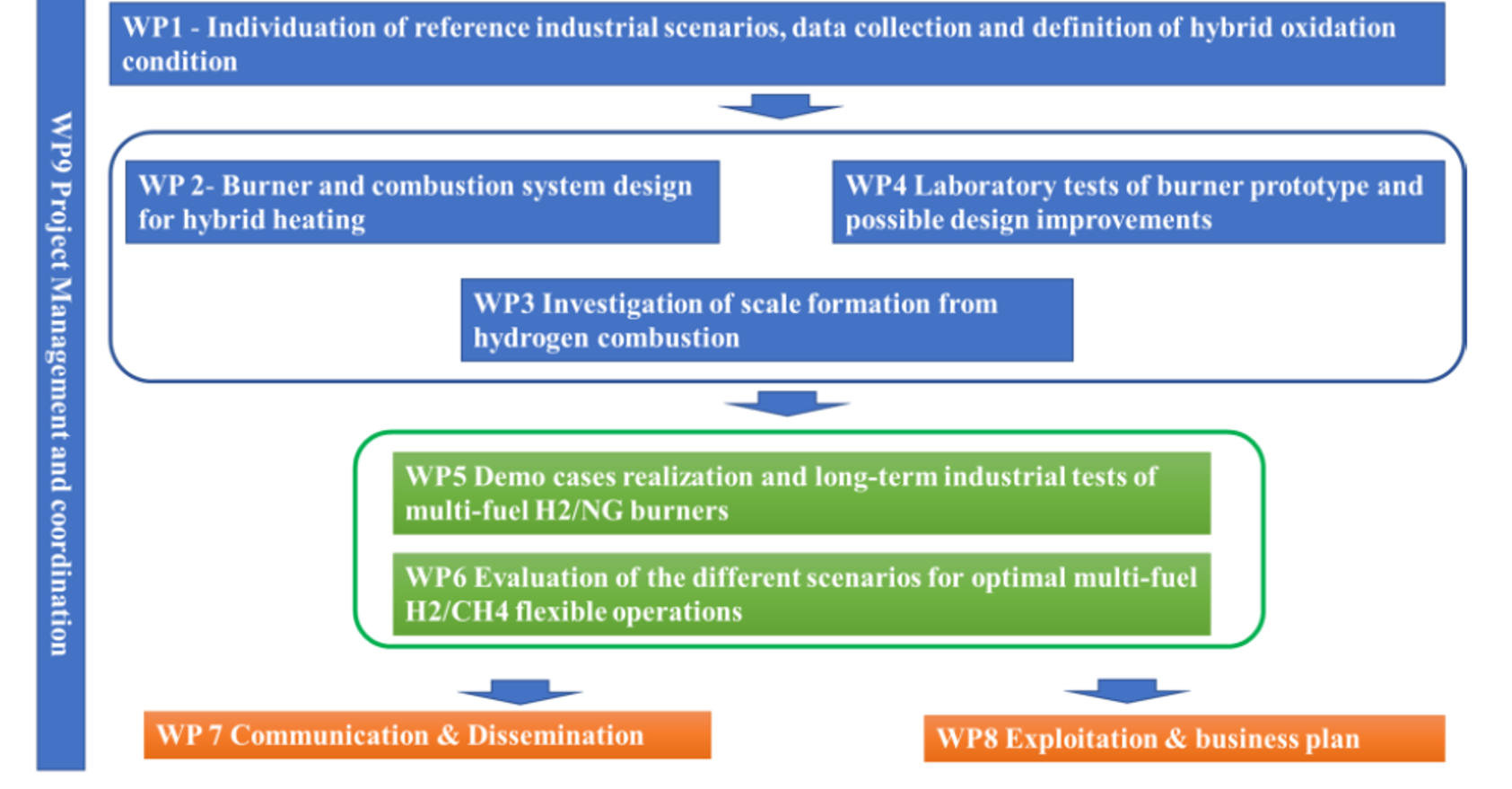Summary
Currently, NG is normally substituted by hydrogen in upstream processes (both blast furnace and DRI), or limited application in finishing lines. Current downstream processes totally rely on NG burning as thermal source. Therefore, the massive usage of hydrogen in steel industry, as envisioned in the Carbon Direct Avoidance pathway of the ESTEP/EUROFER masterplan, requires a transformation of entire steelmaking process from liquid production process (UPSTREAM) to the rolling and finishing line (DOWNSTREAM). This research project is aimed at adopting hybrid heating technology (based on NG with progressive and increasing H2 utilization) in downstream processes. Thermal treatment and reheating processes, which are common to both BF and EAF route have a significant NG demand (about 50 Nm3/t of produced steel). Also, utilization for ladle preheating has a relevant NG demand (in the range 5-15 Nm3/t). In order to allow the shift from NG to H2 and consequently to reduce the environmental impact by using innovative combustion technologies (like flameless and oxyfuel combustion), impacts on steel quality, refractory and furnace must be assessed at high TRL (7).
Objective
The general objective of this project is to exploit the hybrid heating technologies by evaluating the effects of the steel products, on the refractories and on the combustion systems. Three Demo cases testing innovative multifuel burner and testing the limit of current systems at TRL 7 will facilitate the hydrogen transition of the steel sector. Achieved results will bring to a CO2 saving in the range 7.5-25 Mt/year. Regarding the steel quality, the project activities will individuate the optimum processing parameters to ensure that primary scale and associated scale defects do not persist through to the final product.
Methods
To have a complete picture of the possibility of hybrid technology 3 different democases are envisioned: first in TENOVA democase a hybrid by-design burner will be designed and test in order to evaluate advantage and possible risk needed to be mitigated in this new systems; in TATA democase, a burner currently fully-NG will be adapted to evaluate the limit up to which the current systems can be pushed to work in hybrid heating gas atmospheres without reducing system performance. Finally, in the Nunki democase the effect of hybrid heating system will be evaluated on the quality of the refractory in pre-heating systems.

WP1 - Individuation of reference industrial scenarios, data collection and definition of hybrid oxidation condition is focused on the collection of process data from industrial partners, in order to have the working reference situation. The oxidation and descaling condition will be also defined.
WP2 - Burner and combustion system design for hybrid heating. In this WP the burner prototype and possible variants will be designed by using CFD as verification tool. A complete set of embedded burner sensors will be also identified in order to collect relevant data during the foreseen laboratory and industrial tests.
WP3 - Investigation of scale formation from hydrogen combustion. In this WP oxidation tests on carbon & stainless-steel grades will be carried out: scale growth, morphology/adherences, decarburization will be determined for a large variety of steel grades, allowing the definition of a sort of atlas of oxidation under H2 burning atmosphere. Descaling tests will be also carried out.
WP4 - Laboratory tests of burner prototype and possible design improvements. Laboratory tests are carried out for the existing burners and burner prototype to study flame stability and characteristics, NOx and CO emission performance. Data collection from the embedded sensors during experimental tests and successive post-processing by means of data analysis techniques will also allow the identification of possible modification to the burner design.
WP5 - Demo cases realization and long-term industrial tests of multi-fuel H2/NG burners. This WP is the core of the project. The DEMO CASES will be set up and long-term trials will be carried out to assess the feasibility of Hybrid heating for downstream processes. DEMO cases will refer to reheating processes and ladle refractory preheating.
WP6 - Evaluation of the different scenarios for optimal multi-fuel H2/CH4 flexible operations. This WP is devoted to collect all achieved results summarizing the effect of H2 burning on scale growth and descaling for different steel grade and consequently to evaluate furnace modifications based on the results from DEMo cases. This analysis will allow to carry out first evaluation of cost benefit deriving from H2 utilization in reheating furnaces and refractory preheating.
WP7 - Communication & Dissemination. The main objective of WP7 is the definition and implementation of the Dissemination and Communication strategy. The specific objectives are to define the Communication & Dissemination plan, to create awareness and interest in the wide audience and also to build interest and network with key stakeholders.
WP8 - Exploitation & business plan. The objectives of this WP are to collect all achieved results Based on results and data available from the market and literature an evaluation of cost benefit deriving from H2 utilization will be carried out. LCA analysis of the process will be also done. The trends of availability of green hydrogen will be taken into account. Also, dissemination activities will be carried out according to a purposely prepared dissemination plan.
WP9 - Project Management and coordination. This WP is aimed at project coordination of the different work packages, organization and managing of regular opportunities for the partners to meet and discuss about the content and the progress of the project. compliance of each partner with their obligations under this project (performance, time, cost) and subsequent successful on-time delivery of all project reports and other necessary documents.